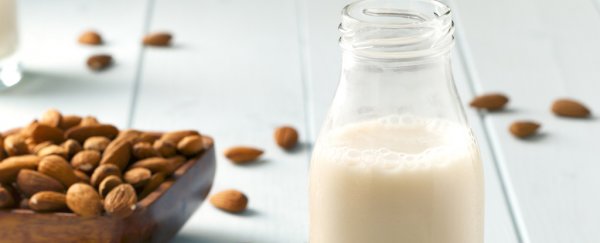In the decades-long war over milk — with purveyors of cow juice on one side and the people who make an increasing array of ecru-colored plant- and nut-based drinks on the other — this is as close to consorting with the enemy as it gets.
The manufacturer of a popular brand of almond milk has announced a recall for what some would say sacrilegious act: Somehow, cow's milk got into their almond milk.
The recall affects nearly 150,000 half-gallon cartons of Almond Breeze almond milk shipped to wholesalers in 28 states, according to the Food and Drug Administration. That is less than 1 percent of all the refrigerated almond milk shipped by HP Hood in the past month.
HP Hood is a national dairy company based in Lynnfield, Mass. Among its brands are Lactaid and Crowley. But the company also handles the production of Almond Breeze, the brand of Blue Diamond Growers, a California almond cooperative.
This revelation could be more than enough to sour fans' perception of the Almond Breeze brand, whose carton features almonds plopping into a sea of pure white liquid.
It was a perception carefully cultivated by Blue Diamond Growers, whose website features a picture of a single perfect almond sitting upright on a wooden table and another photo of a farmer meticulously inspecting a blossoming almond tree.
If the photos weren't enough, the text near the top of the page proudly proclaims: "Almonds are all we do."
But a statement from Hood about the mix-up conjures a different image. The almond milk, after all, was produced in a factory — one that, almond drinkers now know, was essentially playing both sides in the milk wars.
"Although the almond milk is processed on a separate line and filler and we confirmed that the allergen control protocol all standard validation testing was conducted in accordance with our allergen control program, this particular batch of almond milk was contaminated with one container of milk through an employee error," a representative said in an email to CBS News.
"Hood made the decision to recall all of the product from this batch as a precaution."
One person with a lactose allergy was sickened by the almond milk, but Hood said the product is completely safe to drink for anyone without that allergy.
For many, it was another salvo in the greater debate over what is and isn't "milk," with billions in revenue at stake.
Is the dairy industry trying to get back at us by poisoning our almond milk with dairy???
— Victoria Ⓥ (@veggvictoria) August 3, 2018
Blue Diamond almond milk has been recalled, because the product did not contain only almonds and water, but also real dairy milk. Ironic, for the first time their product deserves the name almond MILK, and what do they do, recall it...
— Frank Mitloehner (@GHGGuru) August 3, 2018
People who ship the mammary secretions of cows argue that people who sell hemp, nut and soy-based drinks are using the centuries-old good name of milk to market products that should more appropriately be labeled soy juice or hemp drink.
In 2000 and 2010, the National Milk Producers Federation wrote the FDA to argue for a more exclusive use of the word "milk" on labels. At the time, federation spokesman Christopher Galen told USA Today, "We had to do something," which included creating a Facebook page: "They Don't Got Milk."
Last month, the FDA said it planned to start heavily enforcing a regulation that says the only products companies can call "milk" are things that come from the "milking of one or more healthy cows."
In a statement at the Politico Pro Summit, FDA Commissioner Scott Gottlieb summed it up this way: "An almond doesn't lactate."
The debate has also entered the halls of Congress. Sen. Mike Lee (R-Utah) submitted an amendment to kill spending for the required FDA study that would look at relabeling, according to Roll Call, but it was defeated. Afterward, the National Milk Producers Federation declared a small victory.
"Today's vote should send a very strong message to food marketers who have long been ignoring FDA's food labeling standards by inappropriately using dairy terms on products that do not contain any dairy," the federation said. "Those days are numbered."
The other side argues that no consumer believes that when she buys, say, almond milk, that it originated from a cow.
Declining sales of cow's milk and the exploding market for alternatives is not due to the labelling on the carton, they argue, but rather what's inside it. Increasingly health-conscious consumers view milk alternatives as simply better for them.
Nancy Chapman, executive director of the Soyfoods Association of North America, told The Washington Post in 2016 that her organization has conducted studies of shoppers and found that the "overwhelming majority" — 98 percent — don't confuse it with cow's milk.
"Folks are selecting soy milk because they know it's not from dairy," she said.
2018 © The Washington Post
This article was originally published by The Washington Post.
